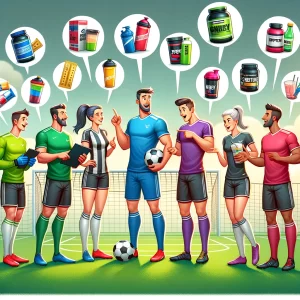
Embracing Healthy Eating for Budding Soccer Stars: Insights from Parents’ Self-Efficacy in Meal Preparation
Are you a parent with a child in soccer, looking to foster their athletic and personal growth? The study “Self-Efficacy of Parents of Boys in Sports Clubs on Meal Preparation and Boys’ Dietary Intake: A Cross-Sectional Study of Soccer Clubs” offers invaluable insights for soccer coaching and player development. This blog will decode the science and suggest practical steps to embrace it daily.
The Power of Parental Self-Efficacy in Children’s Nutrition
The study delves into how parents’ confidence in meal preparation influences the nutritional intake of their children involved in soccer. It emphasizes the need for a balanced diet comprising grains, fish and meat, vegetables, milk, and fruits. The higher the parents’ self-efficacy, the more likely they are to prepare meals that encompass all these essential food groups. This is crucial for children, especially those actively engaged in sports like soccer, as it directly impacts their health, growth, and athletic performance.
Key Findings and Implications
- Higher Self-Efficacy Leads to Better Nutrition: Parents who are confident in preparing balanced meals tend to have children who consume all five food groups more frequently. This is especially significant at breakfast and dinner, critical meals for energy provision and recovery.
- Impact on Athletic Performance: For young athletes, adequate dietary intake is not just about health; it’s about performance and injury prevention. The study indicates that children in soccer clubs who consume a balanced diet perform better and have a lower risk of sports-related injuries.
- The Role of Sports Clubs in Nutrition Education: Sports clubs aren’t just for physical training; they can be vital in imparting nutrition education to both children and parents. By fostering an environment that emphasizes the importance of nutrition, clubs can significantly impact their young athletes’ dietary habits and overall health.
Putting It Into Practice
As parents and coaches, here’s how you can apply these insights:
- Educate Yourself and Your Child: Understand the five food groups and the importance of a balanced diet. Involve your child in meal planning and preparation to educate them about nutrition.
- Set Realistic Goals: Start small by incorporating one or two new food groups into meals, gradually building up to all five.
- Leverage Resources: Utilize the resources provided by sports clubs or seek external nutrition education to improve your meal preparation skills.
- Be a Role Model: Children mimic adult behaviors. By consuming a balanced diet yourself, you can inspire your child to follow suit.
Conclusion
The “Self-Efficacy of Parents of Boys in Sports Clubs on Meal Preparation and Boys’ Dietary Intake” study provides a clear message: parental self-efficacy in meal preparation significantly affects children’s dietary intake, especially those engaged in sports. By embracing these insights, you can ensure your child excels on the soccer field and enjoys a healthy, balanced diet that sets them up for success in every walk of life.
Encourage parents and coaches to read the full article for a comprehensive understanding and practical tips on improving dietary habits for young athletes.
Step into the forefront of soccer innovation with ‘This Week in Soccer’.
Our newsletter is more than just words; it’s an interactive journey through the complexities of soccer analytics and strategy. Whether you’re a coach, educator, or enthusiast, our content is designed to spark curiosity and enhance your understanding. Subscribe today and be part of a community pushing the boundaries of soccer education.



